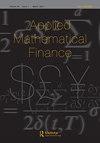Smart Indexing Under Regime-Switching Economic States
Q3 Mathematics
引用次数: 2
Abstract
ABSTRACT Index funds that track a benchmark, such as the market cap-weighted S&P 500 index, tend to have portfolio holdings biased towards slower-growth large-cap equities that result in the fund’s under-performance, especially in economic downturns. We develop a rigorous quantitative framework that allows dynamic-rebalancing of the allocations such that portfolio exposure in a market segment can change periodically based on economic activity, measured via a set of macro-economic and financial indicators. The method incorporates potential shifts in the economic state, and the likelihood thereof, to determine the fund’s risk orientation optimally in tracking or not tracking the benchmark index. That is, the greater the likelihood of a stronger economic state, the higher the degree of tracking the market index; however, a lack of confidence in the economic state results in a more index-neutral portfolio composition. The proposed smart indexing optimal strategy generates superior risk-adjusted returns consistently in out-of-sample testing, relative to (pure) index tracking. We test several variants and present sensitivity analyses that support our actively-managed smart indexing approach.制度转换经济状态下的智能指数
追踪基准(如市值加权标准普尔500指数)的指数基金,其投资组合往往偏向于增长较慢的大盘股,这导致基金表现不佳,尤其是在经济低迷时期。我们开发了一个严格的定量框架,允许动态重新平衡配置,使投资组合在细分市场中的敞口可以根据经济活动定期变化,通过一组宏观经济和金融指标来衡量。该方法结合了经济状况的潜在变化及其可能性,以确定基金在跟踪或不跟踪基准指数时的最佳风险取向。即,经济状态走强的可能性越大,对市场指数的跟踪程度越高;然而,对经济状况缺乏信心会导致投资组合中的指数更为中性。相对于(纯)指数跟踪,所提出的智能指数最优策略在样本外测试中始终产生卓越的风险调整回报。我们测试了几种变体,并提出了支持我们主动管理的智能索引方法的敏感性分析。
本文章由计算机程序翻译,如有差异,请以英文原文为准。
求助全文
约1分钟内获得全文
求助全文
来源期刊

Applied Mathematical Finance
Economics, Econometrics and Finance-Finance
CiteScore
2.30
自引率
0.00%
发文量
6
期刊介绍:
The journal encourages the confident use of applied mathematics and mathematical modelling in finance. The journal publishes papers on the following: •modelling of financial and economic primitives (interest rates, asset prices etc); •modelling market behaviour; •modelling market imperfections; •pricing of financial derivative securities; •hedging strategies; •numerical methods; •financial engineering.
 求助内容:
求助内容: 应助结果提醒方式:
应助结果提醒方式:


